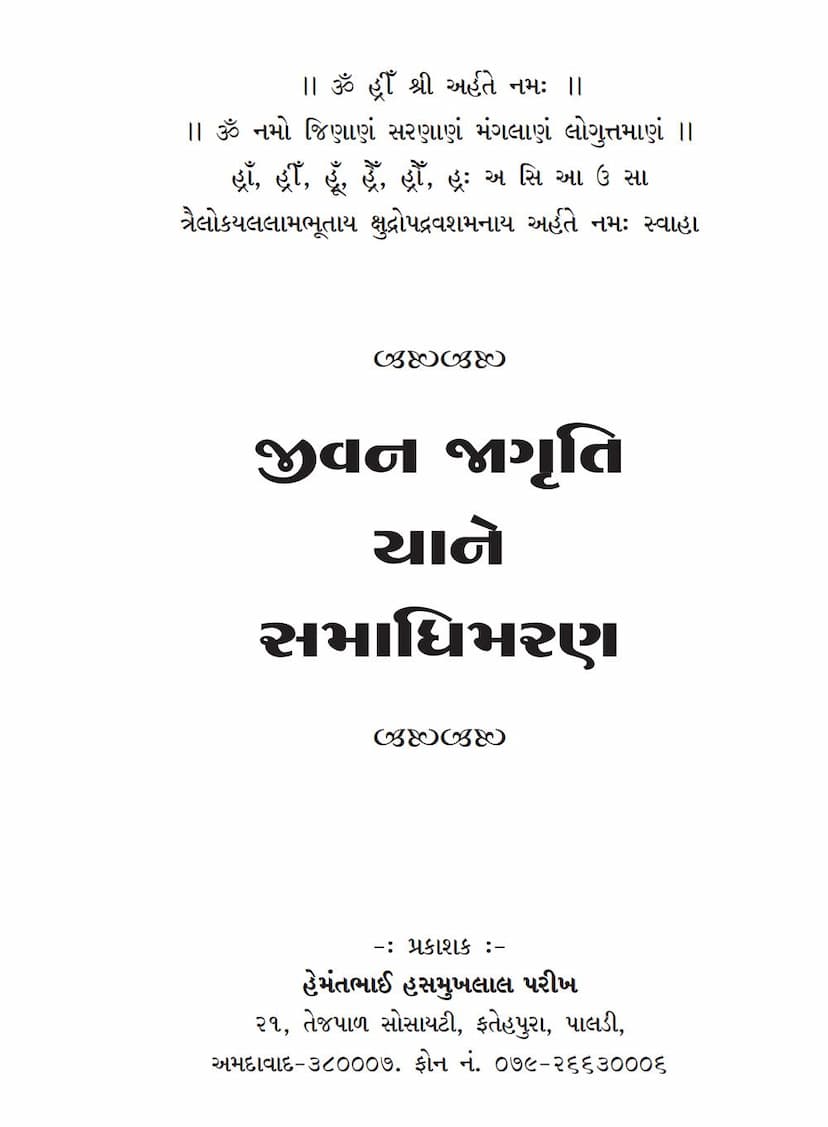Jivan Jagruti Yane Samadhi Maran
Added to library: September 2, 2025

Summary
This Jain text, titled "Jivan Jagruti Yane Samadhi Maran" (Life Awakening and Peaceful Death), authored by Hemant Hasmukhbhai Parikh, is a comprehensive guide on achieving a mindful and peaceful death according to Jain principles. The book emphasizes the importance of spiritual preparation throughout life to ensure a dignified and spiritually beneficial end.
Here's a breakdown of the key themes and content:
Core Message:
The central theme of the book is that death is an inevitable part of life and that with proper preparation and spiritual practice, it can be transformed into a state of peace and liberation (Samadhi Maran). The book advocates for life-awakening (Jivan Jagruti) as a prerequisite for achieving this state, meaning living a conscious, virtuous, and spiritually aware life.
Key Concepts and Practices:
- Need for Samadhi Maran: The book stresses why achieving a peaceful death is crucial, linking it to positive rebirths and ultimately the path to Moksha (liberation). It contrasts "Bala Maran" (ignorant death) with "Pandit Maran" (wise death).
- 10 Pillars/Steps (Adhikars) for Samadhi Maran: The text outlines ten essential spiritual practices or principles that contribute to a peaceful death. These include:
- Attiachar Alochana (Confession of transgressions): Acknowledging and repenting for mistakes made in following the five conduct codes (Panchachar).
- Taking Vows (Vrat Lena): Reaffirming or taking religious vows.
- Seeking Forgiveness (Kshamaapna): Asking for forgiveness from all living beings and forgiving them.
- Taking Refuge (Char Sharana): Seeking refuge in the four ultimate truths of Jainism: Arihant, Siddha, Sadhu, and Dharma.
- Renouncing the 18 Paapsthanak (18 Centers of Sin): Consciously deciding to abandon harmful actions and thoughts.
- Dushkrit Garha (Self-reproach for wrongdoings): Reflecting on and regretting past wrongdoings.
- Sukrut Anumodana (Appreciation of good deeds): Joyfully acknowledging and appreciating the good deeds of oneself and others.
- Shubh Bhavana (Auspicious Thoughts): Cultivating positive and spiritual thoughts.
- Anshan (Fasting): Practicing voluntary fasting, especially at the end of life.
- Navkar Smaran (Remembrance of the Navkar Mantra): Constantly chanting and remembering the most sacred Navkar mantra.
- Detailed Procedures for the Dying: The book provides meticulous instructions on how to guide a person towards a peaceful death. This includes:
- Practices for the Attendants: What those present should do and what they should avoid doing.
- Procedures for Monks and Nuns (Sadhu-Sadhvi): Specific rituals and guidelines for spiritual preceptors.
- Procedures for Householders (Shravak-Shravika): Practical steps for lay followers.
- Short and Elaborate Rituals: Offering different levels of rituals based on the patient's condition and available time.
- Specific Sections on Alochana (Confession): Detailed explanations and mantras for confessing sins related to various actions and intentions, covering all 18 Paapsthanak.
- Emphasis on Bhava (Inner feeling) and Dravya (Outer ritual): While rituals are provided, the purity of intention and devotion are highlighted as paramount.
- Personal Testimonials and Inspirations: The author shares personal experiences and anecdotes of individuals who achieved Samadhi Maran, including his own father and acquaintances, reinforcing the efficacy of these practices.
- The Importance of the Navkar Mantra: The Navkar mantra is presented as a powerful tool for spiritual solace and attainment of a good destiny, even at the last moment of life.
- Guidance on Renunciation: The text advises on gradually detaching from worldly possessions and attachments to prepare for the final journey.
- The Role of Family and Community: It highlights how loved ones can actively participate in facilitating a peaceful death through spiritual guidance and ritualistic support.
Structure and Content:
The book is structured in a logical and systematic manner, starting with the philosophical underpinnings and progressing to practical steps. The "Anukramanika" (Table of Contents) indicates chapters covering the necessity of Samadhi Maran, detailed rituals for the dying, confession of sins, taking vows, seeking forgiveness, taking refuge, renouncing sins, self-reflection on wrongdoings, appreciation of good deeds, auspicious thoughts, fasting, and remembrance of the Navkar mantra.
Overall Purpose:
"Jivan Jagruti Yane Samadhi Maran" serves as a practical and spiritual manual for Jains, empowering them to face death with equanimity and grace. It aims to demystify the process of dying, offering a roadmap for spiritual growth and liberation, thereby fulfilling the ultimate purpose of human life according to Jainism. The book's third edition signifies its continued relevance and acceptance within the Jain community.